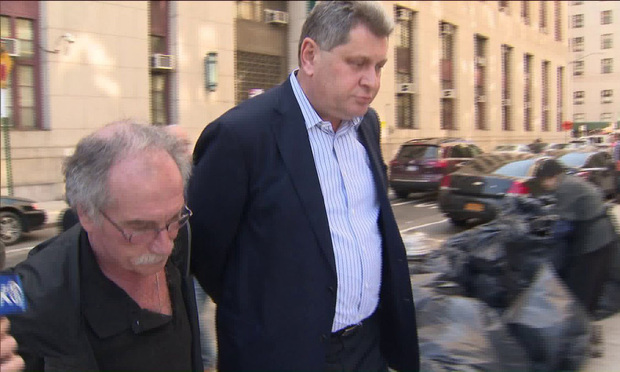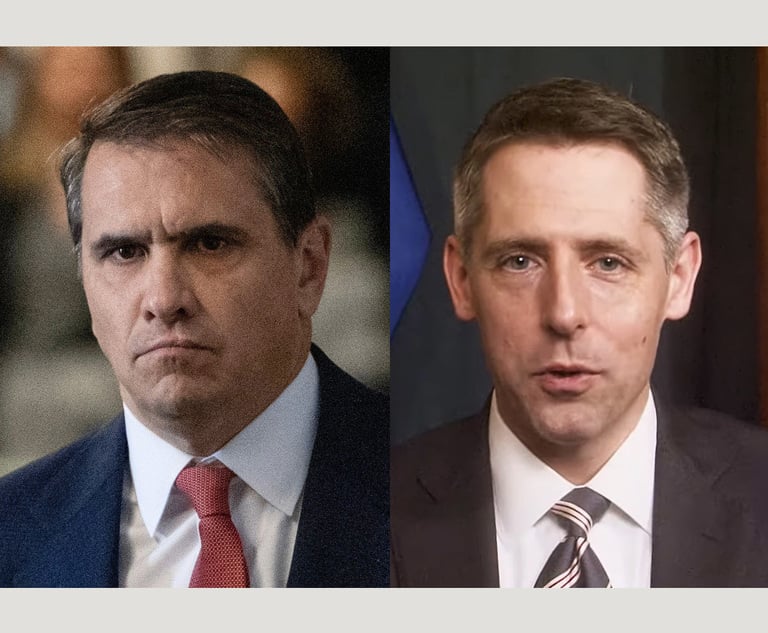Last year, the Office of the Special Narcotics Prosecutor for the City of New York made big headlines. Not only did the office announce, alongside state and federal law enforcement partners, the arrest of more than a dozen people who were allegedly part of a wide-ranging pill mill run out of two doctors’ offices in Brooklyn. They also ensnared a recently departed member of the New York State Assembly, Alec Brook-Krasny, for allegedly helping doctors scrub urinalysis tests of incriminating results as part of the scheme.
That was last April. Since then, the office has faced headwinds in the early stages of the sprawling case that involves over 400 charges against 12 defendants, ranging from commercial bribery against Brook-Krasny to Medicaid fraud against the doctor at the center of the alleged scheme.
The former assemblyman has mounted a substantial defense against his indictments, going so far as to allege a key witness perjured himself during grand jury testimony that secured the second one. Prosecutors have already agreed to a rare downgrading of felony charges to misdemeanors in that indictment. Brook-Krasny’s attorney claims these problems show the fundamental shakiness of the high-profile case against the former elected official and should result in the dismissal of all charges, including the four counts in the initial indictment.
This wasn’t how things appeared at first. Brook-Krasny’s arrest as part of the initial bust led much of the media coverage. The special narcotics prosecutor’s office highlighted the assemblyman’s involvement in a 10-page press release announcing the arrests. Brook-Krasny’s role in the scheme, among a number of allegations in the indictment, was to have the medical lab he worked for, Quality Laboratory Services, delete parts of the urinalysis that tested for the presence of alcohol. This, according to prosecutors, kept patients’ results from being flagged for drinking while taking opioids, which could jeopardize prescriptions for the painkillers.
And that was before a second indictment against Brook-Krasny came down in June, which added four commercial bribery charges on top of the four health care fraud-related charges, including two counts of conspiracy.
In November, Hogan Lovells partner James McGovern, the former criminal division chief in the Brooklyn U.S. Attorney’s Office, filed as part of an omnibus motion his client’s concerns over how prosecutors had come to charge Brook-Krasny of bribery.
First, there was simply an issue of the law. The commercial bribery charges were focused on payments Brook-Krasny’s company made to the wife of an office manager, Konstantin Zeva, who ran the Parkville Medical Health office, one of three involved in the overall alleged scheme. According to the special narcotics prosecutor’s office, Brook-Krasny directed four payments totaling nearly $15,000 to Zeva’s wife for a no-show job at Quality Labs. The payments were part of an agreement to keep urinalysis business coming to Quality.
The problem, according to Brook-Krasny, is that prosecutors failed to establish an essential element of the commercial bribery statute: harm to the employer. Quality was paid for its urinalysis testing not by Zeva or his employer, but instead by Medicaid. This fact, the former assemblyman argued, “undermines any government claim” that the alleged bribes to Zeva hurt the medical clinic financially.
Brook-Krasny urged that the counts be dismissed, or at least, “in the alternative,” reduced to misdemeanors.
In its February response, prosecutors said that the indictment should stick, but not the felony charges. After reviewing the statute, the special narcotics prosecutor’s office acknowledged that Brook-Krasny was right. Prosecutors asked that the commercial bribery charges, the contents of the entire second indictment, go from felonies to misdemeanors.
The government said it had “provided erroneous jury instructions … concerning the economic harm element” of the felony charges. It had said jurors could use “the amount of each of the kickbacks provided … in determining whether economic harm had been caused.” In a response to a series of emailed questions, a spokeswoman from the special narcotics prosecutor’s office noted that the overarching case involved a “complex investigation with multiple defendants and three indictments containing hundreds of charges.”
When specifically asked about the decision to agree to the charge reductions, the spokeswoman stated that, after the issue was raised, “we researched it and conceded error.”
Charges against Brook-Krasny weren’t the only ones the special narcotics prosecutor’s office acknowledged needed to be changed. In one of the indictments, prosecutors agreed that some nine counts against other defendants were multiplicitous, while another five were acknowledged to be beyond the statute of limitations. This, of course, still left hundreds of counts that prosecutors argued should absolutely stick, for both Brook-Krasny and the other defendants.
Brook-Krasny raised an additional issue. In multiple motions, the former elected official detailed his allegation that the same Zeva he was alleged to have bribed committed perjury when he testified before the grand jury as a state’s witness to help secure the commercial bribery charges.
Brook-Krasny pointed to the transcripts of Zeva’s grand jury testimony, when he detailed just how the alleged bribery occurred. According to Zeva, he was stuck in what amounted to an illicit bribe war. He was told by the doctor in charge of the clinic he managed to direct a substantial portion of its urinalysis and blood testing business to Quality Labs. Zeva said the decision didn’t sit well with a medical testing service he’d previously used called Metropolitan.
In an attempt to retain business, Zeva said Felix Gluck of Metropolitan began bribing him. This, Zeva testified, occurred in early summer 2016 and resulted in approximately $15,000 in bribe payments. Shortly thereafter, Zeva said, his boss at the clinic decided to direct all of his testing needs to Quality. Despite now having all of the testing business, Zeva testified that Brook-Krasny then approached him and asked if Gluck ever “[took] care of you.” When Zeva answered that he had, Brook-Krasny said he’d then do the same thing, the government’s witness testified before the grand jury.
The only problem, according to Brook-Krasny, is that, among the documents prosecutors used to justify a warrant to search the former assemblyman’s home were checks from Gluck to Zeva in the amounts of the alleged bribes. But the dates on the checks were a year earlier, in 2015. At the time, Brook-Krasny was still serving in the Assembly, a month or so away from joining Quality Labs.
“Zeva’s false statements before the grand jury infected the People’s entire presentation and permitted the prosecution to weave an entirely fabricated narrative—that they knew or should have known to be false—of competing laboratories bribing [the doctors’ offices] for their business,” Brook-Krasny stated in his motion. He noted that Zeva has a prior felony conviction “for engaging in very similar conduct.”
Ultimately, the alleged false testimony raises questions about the evidence used to establish Brook-Krasny’s intent in facilitating payments to Zeva, and, therefore, the commercial bribery charges, the former assemblyman stated. He’s asked the court to therefore dismiss the commercial bribery counts in their entirety.
While acknowledging the improper jury instructions, the spokeswoman for the special narcotics prosecutor’s office stated that “[g]rand jury instructions and witness credibility are two separate matters.”
“Fact finding is an issue for a jury. Jurors have an opportunity to evaluate witness credibility, corroborative evidence and all the other evidence in the case,” she said. “We are mindful of our ethical obligations and have adhered to them.”
Brook-Krasny’s arguments for dismissal have gone beyond simply the bribery charges. He’s sought the dismissal of the initial health care fraud and conspiracy-related indictment, as well. The former assemblyman argues that prosecutors are essentially pinning on Brook-Krasny a kind of mastermind status, when, in reality, he was a nonmedical professional simply doing what the actual medical professionals—or, in Zeva, their representative—told him to do, and often for reasons that, on their face, made sense.
For example, Brook-Krasny states that removing the alcohol tests from the urinalysis came as a request from Zeva, not as an offer from him, and was done because the tests were coming back with false-positive results, not as a way to further a criminal conspiracy.
Brook-Krasny’s attorney, Hogan Lovell’s McGovern, declined to comment.
Earlier this month, New York County Supreme Court Justice Neil Ross heard oral arguments on the motions. The next hearing in the case is scheduled for March 26.
NOT FOR REPRINT
© 2024 ALM Global, LLC, All Rights Reserved. Request academic re-use from www.copyright.com. All other uses, submit a request to [email protected]. For more information visit Asset & Logo Licensing.


 Former New York State Assemblyman Alec Brook-Krasny is escorted to his arraignment in Manhattan on Thursday, April 13, 2017.
Former New York State Assemblyman Alec Brook-Krasny is escorted to his arraignment in Manhattan on Thursday, April 13, 2017.






